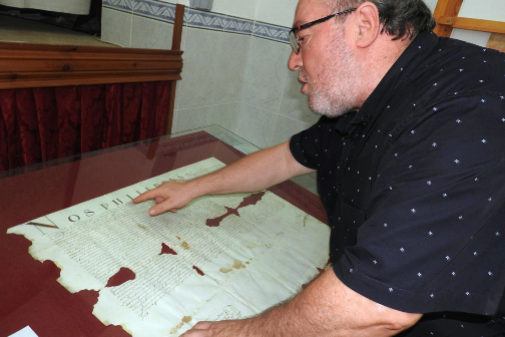The persistence and passion to know the past of its population has led the professor of the Department of European Philology and Cultures of the UJI Josep Manuel Quixal San-Abdon to find a large amount of documentation in the parish church of Càlig, which is located between the years 1,325 and 1,893 and among which there are scrolls signed by the kings Felipe II and Felipe IV.
«I was convinced that there was something in a vault ceiling vault in the form of a vault, between the two sacristies of the church, which convinced the pastor to let me go up . There I discovered more than 180 books and about 3,000 loose documents, ”he said.
To date, it was believed that all the books of the Californian parish were burned during the Civil War , so the finding, with new documentation is very important, «I thought someone left them there to try to preserve them before the contest, but then , seeing that the youngest book goes back to 1893 I discarded it, because from 1893 to 1936 there is nothing, not a paper. What I have concluded is that at the end of the 19th century they left everything that was a definitive archive up there, which was not going to be modified or used.
Quixal is now immersed in the organization and interpretation of the documentation found. We need to finish the signing and cataloging to culminate with the digitalization.
The oldest document, from 1325 , is a notarized deed signed in Valencia. However, the "crown jewel" are two scrolls signed by the kings Philip III and Philip IV. The first is a royal identity card signed by the king in the Monastery of the Escorial on September 29, 1608 giving license to the parish of Vinaròs (which appears written 'Binaros'), to amortize 200 pounds in Valencian real currency, with the privilege of the discount of parts of the crown rights. The second is signed by Felipe IV on June 2, 1621 , giving license to the parish of Càlig to amortize 5,000 pounds in Valencian real coins, with the same privilege. Both parishes argued in their request that there was a delicate economic situation in these municipalities, caused by the progress of the Moors.
Among the books found there are records of management, protocol, collections, mortuaries ... and sacramentals (baptisms, confirmations, weddings, deaths and paschal fulfillment). Also curious documents as a sanction imposed on the priests of Càlig because they did not satisfy the taxes; they are condemned by the person in charge of the order of Santa María de Montesa to deposit 499 pounds, 13 salaries and 10 monies. There is even a payroll of the Inquisition, from the 17th century.
Among the files was, for example, a roll of documents, "well tied with a bow, very exquisite" in whose envelope was "letters of little importance." "It was a great surprise to open it and discover that they were fundamentally economic, like a letter from the Bishop of Tortosa warning who is not paying their debts."
Studying these books and documents found, some in poor state of conservation, you can see how the population of Càlig grows because the relationship of people living in each house appears, «you can see that in 1614 Càlig had 600 inhabitants and only counted with 6 streets, because nobody wanted to live outside the walls ». Also know the last names and first names of centuries ago ; for example, in 1614, there were 51 Isabeles (then Isabeth), 48 Cupcakes and 35 Ursulas; in male names the most abundant was Pere, with 39 neighbors, followed by Joan.
" This documentation tells the life of Càlig so it serves to better understand how we have been living and growing not only as a society but also as an urban structure," Quixal notes. The fundamental languages used are Latin and Valencian, but they also serve to verify the imposition of Spanish from the Nova Planta Decree and subsequent regulations (1707).
According to the criteria of The Trust Project
Know more- Castellón
- Valencian Community
- Spanish Civil War
- society
- history
Research A study detects a high number of prisoners with severe mental illness and raises another treatment
Social services Hemiplegic, malnourished and tied to the bed of a residence
CiclismoOnda lives a "historic day" with the departure of La Vuelta and the national recognition of the Cabedo family

